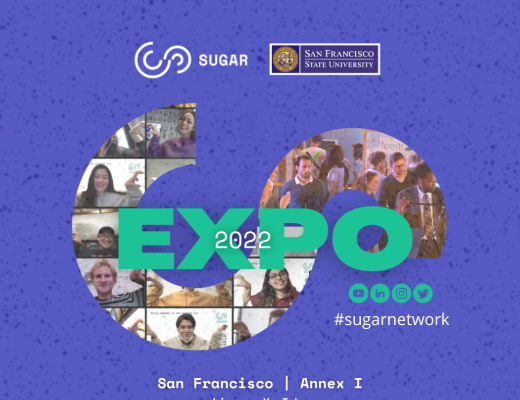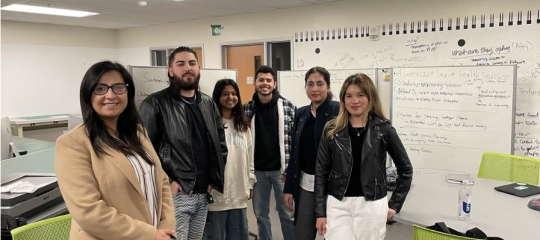Featured Projects

SUGAR Expo 2022
San Francisco State University has been an active participant in the SUGAR Network community since 2017. The SUGAR Network is a global innovation platform that brings together corporate partners with students from over 25 universities representing 4 continents. It enables students to form inter-culture, multidisciplinary teams to prototype and test innovative solutions on real design challenges posed by international corporate sponsors.
The Lam-Larsen Initiative for Emerging Technologies proudly supported the 2022 SFSU SUGAR project in partnership with Ripple and the Warsaw University of Technology (WUT). San Francisco State University also co-hosted the SUGAR Expo Event in 2022. Our team included: Abby Hadidian (Finance), Gelvin Escueta (Information Systems), Alex Chau (Computer Science), and Sarai Aguayo (Marketing/Design).
2024-2025
2023-2024
The goal of this project was to form and mentor a multidisciplinary team of students for the NASA Minority University Research and Education Project (MUREP) Innovation and Tech Transfer Idea Competition (MITTIC). The NASA MITTIC is a highly prestigious competition that enables students from all fields of study (mainly STEM) to rise to the challenge of creating new and innovative technologies to benefit the community and the world. This project was a collaborative effort of the faculty members of the Lam Family College of Business (LFCoB) and the College of Science and Engineering (CoSE), led by Professor Nasrin Mohabbati, Information Systems Department, and was sponsored by the Lam Larsen Initiative for Emerging Technologies.
Our team of multi-disciplinary students consists of Erick Cordero (LFCOB, Marketing); Emilio Mojica (LFCOB, Business management); El Julianna Embalzado (CoSE, Computer Science), Gabriela Franco (CoSE, biology); and Nasrin Mohabbati (Information Systems, LFCoB), Nasser Shahrasbi (Information Systems, LFCoB), and Archana Anand (Biology, CoSE) who served as the faculty mentors. The team focused on leveraging NASA's intellectual property in carbon nanotubes to revolutionize renal failure treatment, addressing a critical healthcare challenge. The students made significant advancements and offered a brilliant idea, which they presented in a promo video and a comprehensive report submitted to the competition. Although the team did not reach the final round, the experience included invaluable outcomes, providing a platform for mutual learning and showcasing the power of multi-disciplinary and diverse STEM in tackling complex challenges.
We extend our thanks to the faculty mentors, department heads, and the College Deans for their unwavering support throughout this endeavor. We also would like to thank Chris Nova and the SFSU Library’s Makers Space for allowing the team to use the space and equipment of the Maker Space for this project.
SF Hack is the annual SF State Hackathon with an international reputation. The 2024 SF Hack was particularly important since it was the first year in-person event post-pandemic, which attracted hundreds of participants/hackers from all over the globe. The hackathon theme tackled the “City Life Challenges” with Emerging Technologies. Many top-tier technology companies supported and sponsored the event, including OpenAI, Google, Cisco, and others. Given the conference's theme this year, our initiative sponsored a special track prize for the best “Emerging Technology” solution. Out of eight teams that participated in our track, the judges selected "SOS Hub" as the winner of our special prize. The group offered an AI-powered emergency response platform leveraging computer vision and natural language processing to assist first responders and emergency services. The solution can be found here.
This project, led by Professors Yikuan Lee and Chenwei Li, aims to explore the opportunities with the application and integration of the current AI tools and Large Language Models (LLM) in the business curriculum. The project has three phases and explores the possibility of integrating current LLMs and chatbots into two courses, including Management Leadership (MGMT 648) and IBUS Entrepreneurship (IBUS 590).
Currently, the project has achieved some of its promised outcomes, including the successful implementation of workshops to prepare students for AI use, a pilot test of AI tools in the MGMT 648 class, and the data collection and experiences from these implementations. Future phases will involve scaling the project to the IBUS 590 class, synthesizing findings, and refining outcome assessment rubrics. Additionally, the project aims to share insights with the LFCoB Outcome Assessment Committee and explore the further integration of AI learning into the BS in Business Administration program curriculum. The project team plans to share their findings through a workshop in our college in Fall 2024.
This project is led by Professor Sameer Verma and aims to integrate DevOps practices into the curriculum by organizing workshops and hands-on projects. The focus areas included Virtualization, Cloud Computing, Containerization, and DevOps, emphasizing continuous integration. The goal is to provide our students with practical skills and real-world experience in these emerging technologies.
In fall 2023, the project team built on the outcomes of a summer 2023 independent study course (ISYS 699) that explored using containers for cloud computing. The exploration included potential Enterprise Systems, IoT, Data Storage, and AI/ML applications. As a result, technologies like Google CoralAI, Nvidia Jetson Nano, and Raspberry Pi were integrated into courses such as ISYS 565 (Business Intelligence), ISYS 574 (Data Warehousing and Data Mining), and ISYS 575 (Information Security Management).
In the spring of 2024, the team completed multiple projects in the DevOps and Enterprise Systems space. An undergraduate student earning three credits through ISYS 699 implemented a collaborative platform using Matter most over a Kubernetes cluster. This project was presented at the CSU Research Competition. Additionally, two graduate students (MBA and MSBA) completed a project through the ISYS 899 independent study course, earning three credits each. They developed a content aggregation and management platform with semantic classification taxonomies, using a decoupled architecture on Google Cloud Platform (GCP) with an immutable operating system (Ubuntu Core). This project helped them earn the graduate certificate in Enterprise Information Systems.
The team also conducted two workshops in spring 2024. The first workshop, "Big Data Analytics: Concepts, Technologies, and Operations," was presented on March 14, 2024, to over 30 students from SFSU and the University of the West Indies. The second workshop, held on April 2, 2024, attracted over 25 students from Information Systems, Computer Science, and General Business. Both workshops were available synchronously and asynchronously.
These workshops and independent studies significantly enhanced students' knowledge and employability by providing operational and real-world skills beyond the classroom. The initiative also laid the groundwork for collaborative projects in the Information Systems department, particularly in courses such as ISYS 565 and ISYS 575, which are part of the Cybersecurity certificate program. The approaches taught are also applicable in fields like Business Analytics, FinTech, and Enterprise Systems, benefiting a broader range of students.
Looking ahead, the project will focus on AI/ML using TensorFlow on Kubernetes for both centralized and edge cloud computing in Fall 2024. This will involve expanding to a multi-node cluster and employing technologies like Google CoralAI, Nvidia Jetson Nano, and Raspberry Pi. With adequate resources and support, this initiative will continue to advance the practical and theoretical understanding of emerging technologies among students.
This project, led by Professor Lutfus Sayeed, aims to develop instructional materials for four hands-on graduate workshops, including two Visual Analytics (VA) workshops and two Large Language Model (LLM) generative AI workshops to be offered to SF State students. The workshops, typically two hours long, will be delivered either in person or online. The VA workshops will be based on Segel and Heer's (2010) work on narrative visualization, balancing author-driven and reader-driven genres to create effective analytics visualizations. The LLM workshops will follow training material guidelines similar to the SAP assignments in ISYS 850 and ISYS 650, focusing on developing business cases and applications.
The project targets the M.S. in Business Analytics and B.S. in Business Administraton programs, utilizing Tableau for VA workshops, which are already subscribed to by the university, ensuring no additional costs. Graduate student assistants, supervised by the Principal Investigator (PI), will develop the workshop materials. Expected outcomes include four training workshops—two in VA and two in LLM—applicable in courses such as ISYS 850 and ISYS 650. These workshops will also be offered independently on campus and presented at pre-conference workshops at AMCIS. As of now, all four workshops have been developed during AY 2023-2024, with two workshops being offered in spring 2024 and two more scheduled for fall 2024.
This project, led by Professor Minh Pham, aims to design and develop a new graduate-level course in Machine Learning and Artificial Intelligence (ML and AI) within the Decision Sciences Department at the Lam Family College of Business. The outcome includes a comprehensive course in AI and ML, including the course outline, syllabus, lecture presentations, discussions, and lab sessions featuring real-world coding examples, assignments, and projects.
The target audience for this course will be graduate students with a foundational understanding of data mining, machine learning, and programming. Students are expected to have prior knowledge in statistics, data mining, machine learning, and Python programming. This advanced course is designed to deepen their expertise and prepare them for the complex challenges in the field of ML & AI. Currently, the project is in progress, with plans to offer the course in fall 2024.
2022-2023
2021-2022
San Francisco State University has been an active participant in the SUGAR Network community since 2017. The SUGAR Network is a global innovation platform that brings together corporate partners with students from over 25 universities representing 4 continents. It enables students to form inter-culture, multidisciplinary teams to prototype and test innovative solutions on real design challenges posed by international corporate sponsors.
The Lam-Larsen Initiative for Emerging Technologies proudly supported the 2022 San Francisco State University SUGAR project in partnership with Ripple and the Warsaw University of Technology (WUT). San Francisco State also co-hosted the SUGAR Expo Event in 2022. Our team included: Abby Hadidian (Finance), Gelvin Escueta (Information Systems), Alex Chau (Computer Science), and Sarai Aguayo (Marketing/Design).
The Lam-Larsen Emerging Technologies Initiative is proud to sponsor and host the 2022 SF Hacks event, which took place during March 11-13, 2022. SF Hacks is a student-run organization that organizes San Francisco’s largest Collegiate Hackathon. This year, it attracted over 500 RSVPed hackers from 26 different countries. About 50 final projects were submitted for judging, and over 1,000 members joined their Discord group. Over the three-day Hackathon event, two FCoB students collaborated with their international teammates closely and implemented a solution that unites cybersecurity and sustainability, which are two important themes of the SF Hacks this year. Their team Resolve Practices won the “Major League Hacking: Most Creative Use of Twilio” Category at SF Hacks. The Resolve Practices consists of team members of Alexandra Power (LFCoB), Bethany Dickson (LFCoB), Sagnik Chatterjee (India), Rhea Shastri (India), and Hong Tran (Texas).
This project was in collaboration with the Center of Excellence at the University of the West Indies and led by Professor Sameer Verma of the Information Systems Department at the Lam Family College of Business. The project aimed to develop a system architecture for IoT implementation in Smart Cities models. A research paper was co-authored by the project manager describing the architectural design of a pilot project that was implemented in Haiti. This research paper is in a revised and resubmitted cycle with the Communications of the AIS. The team is working on a second research paper based on the findings of this project. Data gathered during the pilot from participants will help us in validating the system's architectural design. The team is planning to implement a second pilot and invite the team from the West Indies to organize a workshop with SF State and the City of San Francisco.
The Lam-Larsen Initiative for Emerging Technologies is proud to support the SAP Recognition Award Certificate since 2022. The Information Systems Department has started partnering with the SAP North America University Alliance Program (SAP UAP) to issue the SAP Recognition Award certificate since 2012. This includes upgrading the curriculum by integrating cutting-edge technologies into several ISYS graduate and undergraduate courses. As a result of this program, students at both undergraduate and graduate levels can earn a jointly issued certificate by SFSU and SAP after completing at least three technology-integrated courses. Between the Fall of 2012 and the Spring of 2022, about 330 students received the SAP Recognition Award certificate, including 50 MBA/MSBA students. A preliminary scan of the LinkedIn profiles of SAP Recognition Award certificate recipients showed about 200 students who have been employed in IT-related positions and industries. Most of them highlight SAP ERP skills and SAP Recognition Award certificates in their profiles. Some of them have received internship opportunities as well as full-time employment at high-tech companies such as SAP, Google, Apple, Facebook, Salesforce, PayPal, Symantec, and Cisco.
The Initiative is proud to sponsor two research projects in the blockchain and education domain. These projects aimed to look profoundly into and synthesize the extant literature and contribute to a deeper understanding of the nature and scope of blockchain research in Education. As a result, two independent research were designed and conducted investigating 1) “Blockchain in Education: A Scoping Review and A Research Agenda” and 2) “Blockchain in Business Curriculum.” As of Spring 2022, the first stage of these projects is completed, and the manuscripts are being prepared for journal submission.
The initiative is proud to support five students who were part of the Apple Xcode student club to take the Apple App Development with Swift Certification Exam.
The Initiative is proud to sponsor the CSU Innovation Grant project in the Augmented Reality App project. The goal of this project is to create an Augmented Reality app to showcase ancient instruments from different cultures and the music they create. Augmented Reality technology enables components of the digital world to be blended into a person’s perception of the real world. Packed with high-resolution cameras and high-precision sensors, mobile devices are ready for the prime time of augmented reality apps. It helps create seamless, immersive experiences that can be dynamically interwoven into the physical world.
With the funding of this grant, we visited the Music Instrument Museum in Phoenix, Arizona, in February to capture the 3D models of various musical instruments using photogrammetry technology. Examples of such instruments include Guqin (China), Sitar (India), and Ocarina (Mexico). The project team includes Dr. Weimin Zhang (School of Cinema), Dr. Leigh Jin (Information Systems), and Anh Tran (Information Systems). After experimenting with different techniques and many trials and errors, we succeeded in acquiring the AR assets for our app development purposes. This project was presented at the 2022 Cal State Tech Connect Conference on July 25-28, 2022. The code base developed in this project will be incorporated into the iOS app development curriculum to benefit students interested in learning Augmented Reality app development. In addition, this experience was an effort to facilitate additional collaborations between the School of Cinema and the Information Systems Department on other Augmented Reality-related projects.

